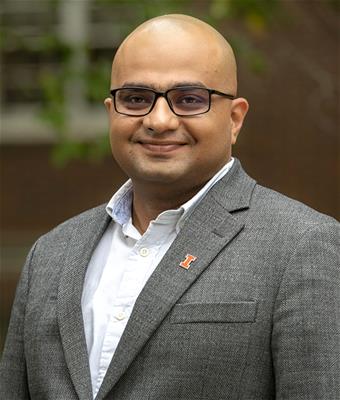
Oct 11, 2022 2022-10 Business Administration Faculty Research in Education
Pursuing collective intelligence with a singular focus
On the road of life, we all have that moment when we realize that the path we’re on is not the one we want to take. For Pranav Gupta, that happened during his mechanical engineering studies. During his senior year. In the middle of an annual robotics competition.
 As his team struggled to solve a number of technical problems, he realized there was an ebb and flow to their progress, and that when the right problem got to the right person, there was no crisis that couldn’t be solved. That’s when he discovered he was far more interested in designing teams that solve complex problems than he was in designing complex robots.
As his team struggled to solve a number of technical problems, he realized there was an ebb and flow to their progress, and that when the right problem got to the right person, there was no crisis that couldn’t be solved. That’s when he discovered he was far more interested in designing teams that solve complex problems than he was in designing complex robots.
That realization led to a masters in design at Cornell University and a PhD in organizational behavior and theory that he recently completed at the Tepper School of Business at Carnegie Mellon University. “I felt very lucky reaching CMU because the folks who did team learning, organizational learning, and collective intelligence were all sort of congregating in Tepper around that time," said Gupta. "That led to my PhD, which is really digging deep into understanding collective intelligence.”
His work, which has been funded by fellowship grants from the Defense Advanced Research Projects Agency (DARPA) and the National Science Foundation, focuses on the emergence of intelligent behavior in digitally augmented teams and self-organized collectives. And to explore those concepts he uses a variety of tools, from lab experiments and archival data to agent-based simulation models.
Some of his recent work focuses on collective intelligence by looking at the way groups manage their collective memory, attention, and reasoning skills to achieve their goals. “All three of these things have to work together,” says Gupta. “Theoretically, it might seem nice to think about them separately, but if you’re thinking about intelligence as a whole, you have to balance across all three. So, I built a simulation model, just like the ones that were built during COVID to try to predict the waves of infection.” Only in his model, he was looking at waves of productivity and how they were impacted by those three key variables.
Gupta also conducted archival research using time-stamped data from GitHub that allows him to analyze how software teams work together over time. “I look at digital traces of their problem-solving interactions — when they’re commenting, when they’re liking something, or when they’re tagging somebody else — to look at behaviors of collective memory, attention, and reasoning.” Just as he suspected, his research indicated that teams that do well on these three functions are more likely to perform and sustain the health of their project over time.
In a related study, he modified an online test for collective intelligence and watched how a group’s collective intelligence was affected when he introduced small tools designed to provide a nudge in those three key areas. “Theoretically, we would say each of them is contributing to the outcome, but every action that you make has a ripple effect.” And those effects, says Gupta, aren’t always what you might expect. “One of the actions we did to motivate folks to put in more effort actually had a negative overall effect. So instead of improving, they started showing downward movement. They started putting in less effort, or the wrong people started putting in more effort.”
For Gupta, these findings only demonstrate the need for further research in the complex dynamics of collective intelligence, as well as the importance of simulations and other research techniques that can turn theories into real-world application. And he says he’s excited to be pursuing all of that at Gies, joining faculty whose work actually inspired him to enter the field.
“Finding good colleagues can really make or break the kind of work that you’re doing.” And Gupta says that the faculty at Gies are among the very best. They’re also doing research in areas that align very well with his interest. “I couldn’t have asked for anything better,” says Gupta.
When he’s not conducting research, the new assistant professor will be teaching Gies undergrads the basics of organizational behavior, using the latest theories to help them understand how group dynamics impact everything from small, short-term projects to organizations as a whole. Of course, Gupta says, it’s not all about learning theory.
“The real value begins when you start applying those theories,” says Gupta. “I want them to build their ability to think about team dynamics systematically, so even if our learning changes or their real-world situation changes drastically, they can apply the theories and improve their outcomes.”
